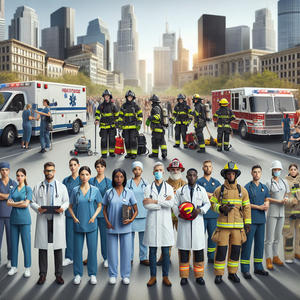
20 Essential Careers That Save Lives: Contributing to Health and Safety
In today's world, the demand for dedicated professionals in emergency response and healthcare continues to grow. If you're looking to embark on a career that makes a genuine difference, you might want to explore various life-saving roles that not only address urgent public safety needs but also provide rewarding experiences. This article highlights 20 impactful professions, ranging from well-known first responders such as Emergency Medical Technicians (EMTs) and firefighters to vital yet often overlooked roles like health services managers and environmental health specialists. Each career plays a crucial part in safeguarding lives, and we'll delve into their responsibilities, the skills required, job prospects, salary expectations, and the emotional and physical demands involved.
Job Summaries:
Emergency Medical Technician (EMT):
- EMTs serve as the frontline heroes in medical crises, providing essential care during emergencies.
- Duties include assessing patients, performing CPR, administering medications, and transporting individuals to hospitals.
- To become an EMT, one must undergo training in emergency medical protocols and obtain certifications like the National Registry of Emergency Medical Technicians (NREMT).
- Projected job growth of 7% from 2021 to 2031.
- EMTs can expect salaries ranging from $30,000 to $50,000, depending on their experience and location.
Firefighter:
- Firefighters are pivotal in ensuring public safety.
- They respond to fires, accidents, and hazardous material incidents.
- Their responsibilities include extinguishing fires, rescuing individuals, and providing emergency medical assistance.
- Firefighters undergo rigorous training to prepare for the physical and mental challenges of the job.
- A 4% growth in demand for firefighters is anticipated through 2031.
- Firefighters earn an average salary between $40,000 and $70,000.
- This profession is both rewarding and impactful.
Police Officer:
- Serving as the guardians of public order, police officers patrol communities, respond to emergencies, and investigate crimes.
- They undergo comprehensive training at police academies and are expected to uphold high ethical standards.
- The role requires quick thinking and adaptability in unpredictable situations.
- The demand for police officers is expected to rise by 5% over the next decade, with salaries typically ranging from $45,000 to $80,000.
Lifeguard:
- Lifeguards play a vital role in ensuring the safety of individuals in aquatic environments.
- They monitor water activities, perform rescues, and provide first aid when necessary.
- Certification in CPR and lifeguarding is essential for this role.
- Lifeguards are crucial in preventing drowning incidents, making it a fulfilling position for those passionate about water safety.
- Salaries for lifeguards generally range from $20,000 to $35,000, and many positions are seasonal.
Physician Assistant (PA):
- Working closely with physicians, Physician Assistants conduct exams, diagnose illnesses, and assist in surgeries.
- A master's degree from an accredited PA program is necessary, along with national certification.
- PAs are vital in delivering life-saving care in emergencies.
- Job growth projected at an impressive 31% from 2020 to 2030.
- They earn an average salary of around $95,000.
Paramedic:
- Paramedics provide advanced emergency medical care in pre-hospital settings.
- They perform life-saving procedures and coordinate with emergency services.
- Extensive training is required, including an associate's degree in emergency medical services.
- The demand for paramedics is projected to grow by 11% from 2021 to 2031.
- Average salaries for paramedics range from $40,000 to $65,000.
Coast Guard Officer:
- Coast Guard Officers are responsible for protecting lives and property on the water.
- They respond to maritime emergencies.
- They conduct search and rescue operations.
- Their training emphasizes leadership.
- The role is essential for ensuring safety at sea.
- The Coast Guard anticipates steady hiring.
- Salaries range from $50,000 to $90,000 based on rank and experience.
Occupational Therapist (OT):
- Occupational Therapists help individuals regain essential skills after injuries or illnesses.
- They create tailored treatment plans to meet patients' unique needs, contributing significantly to both physical and emotional recovery.
- A master's degree in occupational therapy and state licensure are required.
- The field is projected to grow by 14% from 2021 to 2031, with average salaries around $85,000.
Registered Nurse (RN):
- Registered Nurses deliver direct patient care and education.
- RNs often serve as the first line of defense in health emergencies.
- An accredited nursing program is necessary for licensure.
- Passing the NCLEX-RN exam is necessary for licensure.
- RNs play a crucial role in improving patient outcomes.
- Salaries for RNs average around $75,000.
- Job growth for RNs is expected to be 6% over the next decade.
Health Services Manager:
- Health Services Managers oversee the administrative functions of healthcare facilities.
- They ensure efficient operations and high-quality patient care.
- Typically require a bachelor's or master's degree in health administration.
- This role is essential for enhancing healthcare delivery.
- Job growth projected at 32% from 2020 to 2030.
- Average salaries around $101,000.
Veterinarian:
- Veterinarians diagnose and treat animal illnesses.
- They play a crucial role in public health by preventing zoonotic diseases.
- A Doctor of Veterinary Medicine (DVM) degree and state licensure are essential.
- The field is expected to grow by 17% from 2020 to 2030.
- Average salaries are around $100,000.
Mental Health Counselor:
- Mental Health Counselors provide support and therapy for individuals facing emotional and psychological challenges.
- A master's degree in counseling or psychology and state licensure are typically required.
- Their work is vital for early intervention.
- Job growth is expected to be 23% from 2020 to 2030.
- Salaries average $50,000.
Search and Rescue (SAR) Technician:
- SAR Technicians respond to emergencies such as natural disasters and missing persons.
- Their training includes wilderness survival and advanced first aid.
- This role is physically demanding and essential in saving lives during crises.
- Salaries for SAR Technicians typically range from $35,000 to $60,000.
- Various openings are available through local and national rescue organizations.
Surgical Technician:
- Surgical Technicians assist in operating rooms.
- They ensure sterile environments and the availability of instruments.
- A postsecondary certificate or associate degree in surgical technology is usually required.
- This role is critical for the success of surgical procedures.
- The average salary is $49,000.
- Job growth is projected at 9% through 2030.
Water Rescue Officer:
- Water Rescue Officers respond to emergencies in aquatic environments.
- Conducting rescues and providing safety education.
- Certification in water rescue techniques is necessary.
- Positions are available in municipalities and recreational facilities.
- Salaries typically range from $30,000 to $50,000.
Pharmacist:
- Pharmacists dispense medications and provide patient education to ensure safe pharmaceutical use.
- A Doctor of Pharmacy (PharmD) degree and state licensure are required.
- Their expertise in medication management contributes to life-saving outcomes.
- The demand for pharmacists is expected to grow by 2% from 2020 to 2030, with salaries averaging $128,000.
Medical and Health Services Manager:
- These managers oversee specific departments in healthcare facilities, ensuring efficient service delivery and compliance with regulations.
- A bachelor's or master's degree in health administration is typically needed.
- Job growth in this field is projected at 32%.
- Salaries average around $101,000.
Clinical Research Coordinator:
- Clinical Research Coordinators manage clinical trials aimed at developing new treatments and therapies.
- A bachelor's degree in a related field is usually required, with certification available for specialization.
- Their work is vital for advancing medical knowledge.
- Job growth expected to be 10% over the next decade.
- Average salaries around $72,000.
Environmental Health Specialist:
- Environmental Health Specialists protect public health by assessing environmental risks.
- A bachelor's degree in environmental science or a related field is typically required.
- Their work is crucial in preventing health crises related to environmental hazards.
- Job growth is expected to be 11% through 2030, with salaries averaging around $70,000.
Disaster Response Coordinator:
- Disaster Response Coordinators prepare for and respond to emergencies.
- Develop response plans and coordinate training.
- A degree in emergency management or a related field is usually required.
- This position is vital in saving lives during disasters.
- Job growth projected at 8%.
- Average salaries around $65,000.
Each of these careers offers a unique opportunity to save lives and significantly impact communities. For individuals interested in pursuing a meaningful career in one of these fields, exploring current job openings can serve as a valuable first step towards making a difference in the world.
Explore More Jobs

